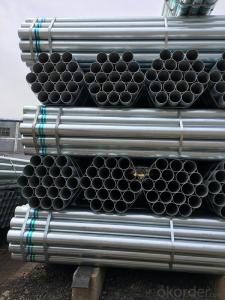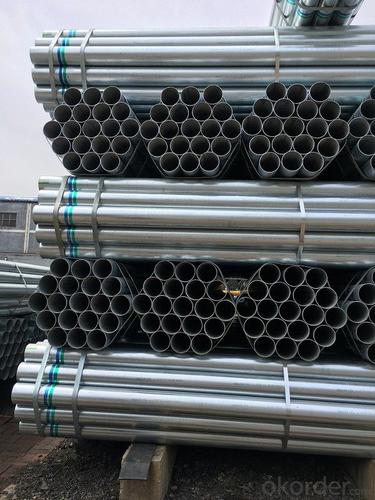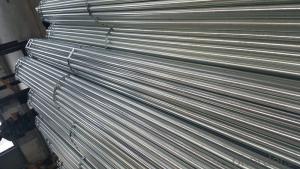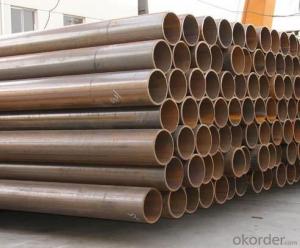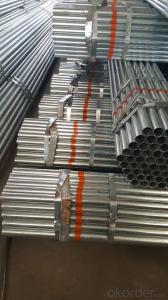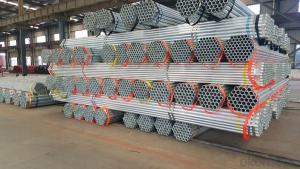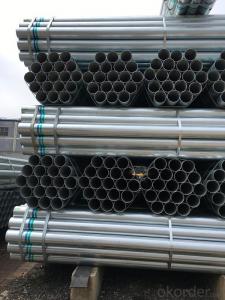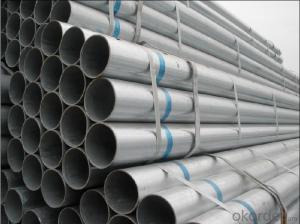Galvanized welded steel pipe for heating water pipe
- Loading Port:
- Shanghai
- Payment Terms:
- TT OR LC
- Min Order Qty:
- 12 m.t.
- Supply Capability:
- 16000 m.t./month
OKorder Service Pledge
OKorder Financial Service
You Might Also Like
Specification
1、Structure of Galvanized welded steel pipe for heating water pipe:
The surface of galvanized steel pipe welded steel pipe of hot dip galvanized layer or. Galvanized can increase the corrosion resistance of the steel tube, prolong service life. Galvanized pipe is widely used, in addition to water, gas, oil and other general low pressure fluid pipelines. It is also used in the petroleum industry, especially for offshore oil field of oil well pipe and oil pipe, chemical, coking equipment of oil heater, condensation cooler, coal run oil exchanger tube, and trestle pile, the mine tunnel support frame tube.
2、Main Features of Galvanized welded steel pipe for heating water pipe:
• High manufacturing accuracy
• High strength
• Good visual effect
• Reasonable price
3、Galvanized welded steel pipe for heating water pipe Specification:
Standard | GB, DIN, ASTM ASTM A106-2006, ASTM A53-2007 |
Grade | 10#-45#, 16Mn 10#, 20#, 45#, 16Mn |
Thickness | 1 - 33 mm |
Section Shape | Round |
Outer Diameter | 21 - 610mm |
Place of Origin | Tianjin, China (Mainland) |
Secondary Or Not | Non-secondary |
Application | Hydraulic Pipe |
Technique | Cold Drawn |
Certification | API |
Surface Treatment | factory state or painted black |
Special Pipe | API Pipe |
Alloy Or Not | Non-alloy |
Length | 5-12M |
Outer Diameter | 21.3-610mm |
Grade | 20#, 45#, Q345, API J55, API K55, API L80, API N80, API P110, A53B |
Standard | ASME, ASTM |
1) Material:Q195 Q235 Q345 X42 X52
2) Specification range:OD:21.3-610mm,WT:6-70mm,length:6-12m or according to the requirement of clients.
3) Excutive standards:GB,ASME API5L.ASTM A 106/A53,Despite of the above standards,we can also supply seamless steel pipe with standard of DIN,JIS,and so on,and also develop new products according to the requirements of our clients!
4) Surface: galvanized.
5) Ends:Beveled or square cut,plastic capped,painted.
6) Packing:bundles wrapped with strong steel strip,seaworthy packing.
4、Packaging & Delivery
Packaging Details: | seaworthy package,bundles wrapped with strong steel strip |
Delivery Detail: | 15-30days after received 30%TT |
5、FAQ of Galvanized welded steel pipe for heating water pipe:
①How is the quality of your products?
Our products are manufactured strictly according to national and internaional standard, and we take a test
on every pipe before delivered out. If you want see our quality certifications and all kinds of testing report, please just ask us for it.
Guaranteed: If products’ quality don’t accord to discription as we give or the promise before you place order, we promise 100% refund.
②How about price?
Yes, we are factory and be able to give you lowest price below market one, and we have a policy that “ for saving time and absolutely honest business attitude, we quote as lowest as possible for any customer, and discount can be given according to quantity”,if you like bargain and factory price is not low enough as you think, just don’t waste your time.Please trust the quotation we would give you, it is professional one.
③Why should you chose us?
Chose happens because of quality, then price, We can give you both.Additionally, we can also offer professional products inquiry, products knowledge train(for agents), smooth goods delivery, exellent customer solution proposals.Our service formula: good quality+good price+good service=customer’s trust
SGS test is available, customer inspection before shipping is welcome, third party inspection is no problem.
6、 Galvanized welded steel pipe for heating water pipe:
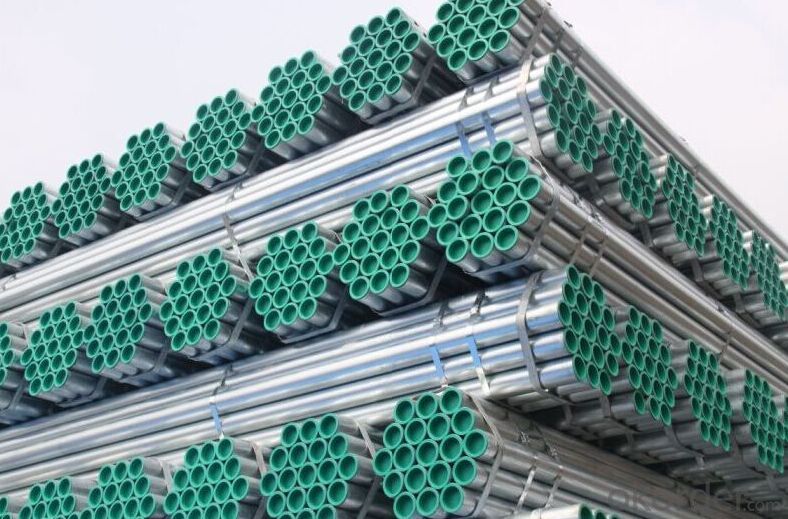
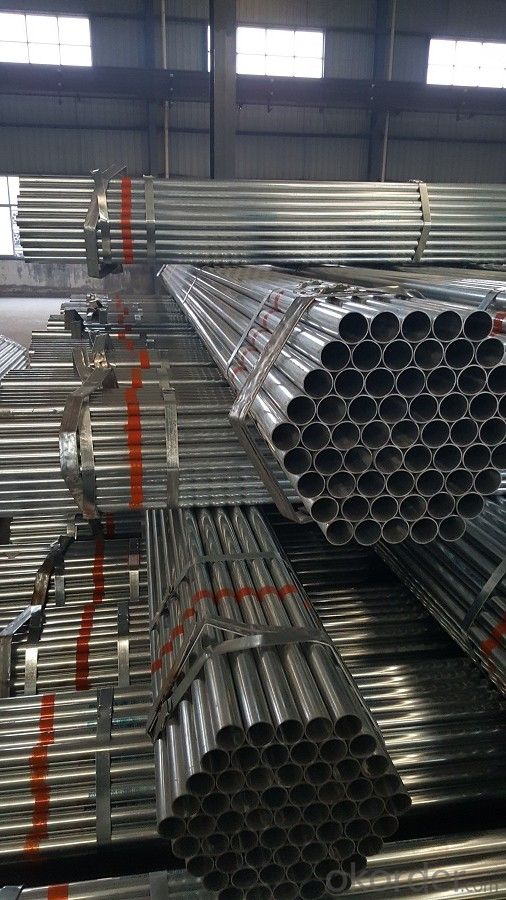
- Q: Are steel pipes suitable for underground oil pipelines?
- Steel pipes are indeed appropriate for underground oil pipelines. Steel is frequently employed in oil pipelines because of its considerable strength, durability, and resistance to corrosion. Underground oil pipelines encounter different external influences like soil displacement, humidity, and chemicals, but steel pipes can effectively endure these circumstances. Furthermore, by welding steel pipes, a seamless and uninterrupted pipeline can be formed, minimizing the chances of leaks or ruptures. Furthermore, steel pipes have a long history of successful utilization in the oil sector, offering a dependable and cost-efficient method of transporting oil underground.
- Q: How are steel pipes classified based on their schedule?
- Steel pipes are classified based on their schedule, which refers to the wall thickness of the pipe. The schedule classification system includes different numbers such as 5, 10, 40, 80, etc., which indicate the thickness and strength of the steel pipe.
- Q: What is the difference between steel pipe and fiberglass pipe?
- Steel pipe and fiberglass pipe differ in terms of material composition, durability, flexibility, and cost. Steel pipe is made of steel, which provides strength and resilience, making it ideal for high-pressure applications and underground installations. Fiberglass pipe, on the other hand, is composed of reinforced plastic fibers, resulting in a lightweight and corrosion-resistant material suitable for above-ground and corrosive environments. While steel pipe offers higher tensile strength, fiberglass pipe excels in its flexibility, allowing for easier installation and reduced maintenance. Additionally, steel pipe is typically more expensive due to the cost of materials and manufacturing processes, while fiberglass pipe is more cost-effective in terms of initial installation and long-term maintenance.
- Q: Can steel pipes be used for cooling systems?
- Yes, steel pipes can be used for cooling systems. Steel pipes are commonly used in various applications, including cooling systems, due to their durability, strength, and resistance to high temperatures and pressure. They are particularly suitable for industrial cooling systems where there may be harsh environmental conditions or corrosive fluids. Steel pipes have excellent heat conductivity, which enables efficient heat transfer, making them a reliable choice for cooling applications. Additionally, steel pipes can be easily fabricated, welded, and customized to meet specific cooling system requirements. However, it is important to ensure that the steel pipes used are properly coated or insulated to prevent corrosion and minimize heat loss.
- Q: What is the diameter of the steel tube DN20?
- The symbol is DN, the unit is mm, but omitted to write. Also available in English in.
- Q: What are the factors affecting the cost of steel pipes?
- There are several factors that can affect the cost of steel pipes. Some of the main factors include the price of raw materials, such as iron ore and coal, which are used in the steel manufacturing process. Additionally, the cost of labor, transportation, and energy can also impact the overall cost of steel pipes. Market demand and competition within the industry can also influence prices. Finally, factors such as government regulations, trade policies, and currency exchange rates can also play a role in determining the cost of steel pipes.
- Q: What is the impact of temperature on steel pipes?
- The significance of temperature on steel pipes cannot be underestimated, as it can bring about both positive and negative consequences. When exposed to high temperatures, steel pipes undergo thermal expansion, which can result in distortion or buckling. This expansion also has the potential to affect joints and connections, leading to leaks or failures. Hence, it is imperative to take into consideration the coefficient of thermal expansion during the design and installation of steel pipes in environments with elevated temperatures. Conversely, steel pipes possess remarkable thermal conductivity, enabling them to endure high temperatures without substantial deterioration. This characteristic renders them suitable for applications where heat transfer is of utmost importance, such as in industrial processes or heating systems. Extreme cold temperatures also pose a threat to steel pipes. Freezing conditions cause water or other fluids within the pipes to expand, resulting in cracks or bursts. This can lead to leaks, fluid loss, and potential harm to surrounding structures. Consequently, it is necessary to implement appropriate insulation and preventive measures to ensure the integrity of steel pipes in cold environments. Moreover, temperature fluctuations can impact the mechanical properties of steel, including its tensile strength and toughness. Prolonged exposure to elevated temperatures can cause a phenomenon known as thermal degradation, which diminishes the steel's strength and renders it more susceptible to deformation or failure. In conclusion, temperature exerts a significant influence on steel pipes, affecting their structural integrity, thermal performance, and mechanical properties. Proper design, insulation, and maintenance are crucial to guarantee the safe and efficient operation of steel pipes under varying temperature conditions.
- Q: How are steel pipes used in the telecommunications industry?
- Steel pipes are commonly used in the telecommunications industry for the installation of underground and overhead cables. These pipes provide a protective casing for the cables, ensuring their safety from external elements and physical damage. Additionally, steel pipes are used in the construction of telecommunication towers and infrastructure, providing support and stability for antennas, satellite dishes, and other communication equipment.
- Q: What is PE coated steel pipe? Seek explanation
- PE coating on the inner wall of steel pipe steel pipe is covered with a layer of polyethylene plastic polymer, PE, polyethylene (Polyethylene of raised temperature is the abbreviation of resistance English), the scope of application of the general PE pipe water supply pipe to a temperature below 40 DEG C, cannot be used for hot water transmission pipeline.
- Q: What are the different types of steel pipe connections for fire sprinkler systems?
- There are several types of steel pipe connections used in fire sprinkler systems including threaded connections, grooved connections, flanged connections, and welded connections.
Send your message to us
Galvanized welded steel pipe for heating water pipe
- Loading Port:
- Shanghai
- Payment Terms:
- TT OR LC
- Min Order Qty:
- 12 m.t.
- Supply Capability:
- 16000 m.t./month
OKorder Service Pledge
OKorder Financial Service
Similar products
Hot products
Hot Searches
Related keywords
